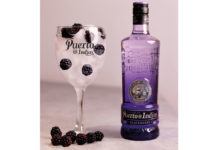Innovation credited with bolstering sales of spirit

A TREND towards innovation, both in terms of new products and unusual serves, is helping to grow the gin category.
That was the message from drinks firms contacted by SLTN, who said experimentation by producers and bartenders has had a part
icularly positive impact on gin.
“Gin innovation seems to be accelerating,” said Karen Stewart of gin brand Darnley’s View. “The drive from the USA for craft spirits is taking hold in the UK too.
“Cocktail menus are increasingly having dedicated gin sections which are easy to adapt to seasons and times of the day,” she said.
Unsurprisingly, drinks firms have been keen to capitalise on the trend towards premium and craft products.
Ian Peart, on-trade director for spirits at Pernod Ricard, whose gin brands include Plymouth and Beefeater, told SLTN that premium spirits are currently outperforming their non-premium counterparts.
And he attributed part of the growth to bartenders.
“This growth is coming from a range of elements, such as an increase in support from bartenders, which leads to greater awareness across the on-trade, which in turn attracts new consumers to the category and ultimately drives growth,” said Peart.
“Bartenders are experimenting more, which is leading to success for the gin category, particularly in relation to cocktails,” he said.
However, some things can change while staying the same, and so it seems to be with the gin category.
“The classic gin and tonic serve continues to be the biggest driver of gin,” said Sean Ware of Bacardi Brown-Forman Brands, distributor of Bombay Sapphire.
“There has been a huge resurgence within the gin category but also of the gin and tonic itself, partly taking inspiration from Spain which has long been enjoying gin and tonic in balloon glassware,” he added.
The classic gin and tonic serve continues to be the biggest driver of gin.
Frazer McGlinchey of Scottish gin brand Caorunn agreed, describing gin and tonic as a classic serve “which is difficult to better”.
However, he acknowledged that creating new serves is a crucial ingredient to lasting success.
“Evolution and innovation are the lifeblood of the industry, and will remain as vital as ever,” said McGlinchey, who also pointed to the initiative being taken by some Scottish bartenders.
“Some bars are looking at batching and ageing cocktails and spirits to tweak the characteristics of the liquids, while some are even challenging preconceptions about the nature of the cocktail and how it is served,” he said.
And in recent years it isn’t just bartenders and mixologists that are demonstrating a more discerning taste, according to McGlinchey, who advised operators to stock a range of premium quality products with real provenance and heritage if they want to make the most of their gin sales.
“It’s much harder to fool customers with poor products and fake back-stories, and that can only be a good thing to ensure excellence and integrity in the industry, which is what we should all strive for,” he said.























